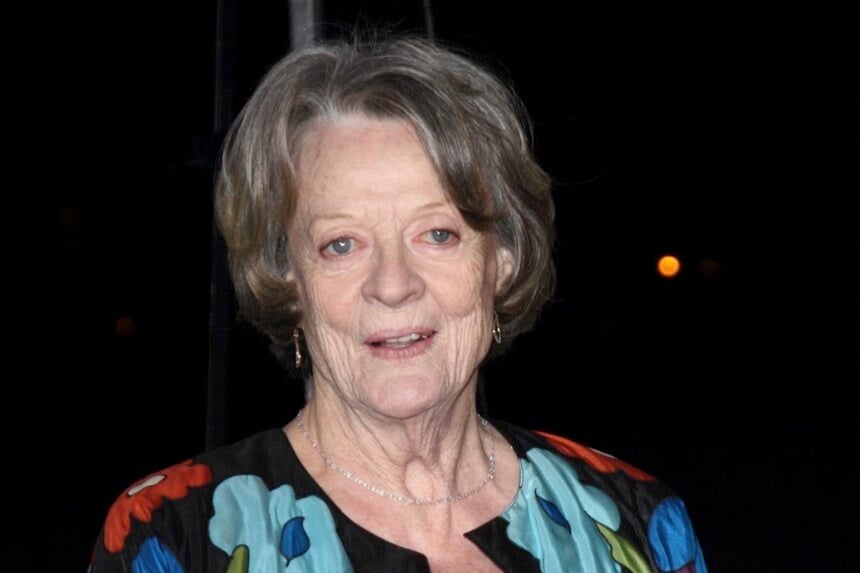The world has lost a titan of the stage and screen. Dame Maggie Smith, the revered British actress renowned for her impeccable talent and inimitable wit, breathed her last on September 27th, 2023, at the venerable age of 89. The news of her passing was shared by her beloved sons, Chris Larkin and Toby Stephens, who paid a heartfelt tribute to their “extraordinary mother and grandmother” in a statement released through her publicist, Clair Dobbs.
Smith’s passing marks the end of an era, as she was one of the last remaining legends of her generation, a true icon whose illustrious career spanned over six decades. Her impact on the world of acting is immeasurable, and her legacy will forever be etched in the annals of entertainment history.
A Childhood Steeped in Theatricality
One must delve into her formative years to understand the depth of Smith’s artistry. Born Margaret Natalie Smith on December 28th, 1934, in Ilford, Essex, she grew up in a household that was, ironically, devoid of the very essence that would come to define her life – theatricality.
Her mother, a staunch Presbyterian, doubted her daughter’s chances of succeeding as an actress, famously remarking on her “face like that.” Conversely, her father, Nathaniel Smith, a public health pathologist, was more supportive, diligently collecting and preserving her clippings, despite harboring his own suppressed theatrical inclinations.
From a young age, Smith found solace in the world of make-believe, entranced by a series of books titled The Swish of the Curtain. Acting, for her, was a portal to a “much better world,” as she confided to critic Nancy Banks-Smith, a realm where she could shed her inherent shyness and inhabit characters far removed from her own reality.

MAGGIE SMITH. PHOTO BY HENRY McGEE/GLOBE PHOTOS, INC
Honing Her Craft: From Oxford to Broadway
After attending Oxford High School for Girls, an experience she did not particularly enjoy, Smith’s journey truly began at the Oxford Playhouse School of Theatre. It was here that her unique talent caught the eye of playwright Beverley Cross, the man who would later become her second husband.
Cross recognized Smith’s distinctiveness, noting her departure from the prevalent “Oxford theatrical voice” of the time. He saw in her a rare vulnerability and an innate comedic flair that would become her hallmarks.
Smith’s aptitude for comedy and her ability to infuse lines with a stinging, rebellious humor quickly garnered attention. She honed her timing and improvisation skills in revue shows before making her Broadway debut in the aptly titled New Faces of 1956.

Conquering the Stage: A Force to be Reckoned With
While Broadway provided Smith with her initial taste of success, it was the British stage that became her true domain. In the 1960s, she graced the hallowed boards of the West End and the Old Vic, working under the artistic directorship of the legendary Laurence Olivier, despite their reported differences.
Smith’s versatility was unparalleled, as she effortlessly transitioned from the works of Chekhov and Strindberg to the Bard himself, though she confessed that Shakespeare was “not my thing.” Her appetite for variety was matched only by her intense work ethic, often pacing the stage like a “caged creature” during rehearsals, eschewing the notion of coffee breaks.
Her performances garnered critical acclaim and numerous accolades, including a record six Evening Standard Awards, cementing her status as a force to be reckoned with on the British stage.

Hollywood Beckons: Conquering the Silver Screen
While Smith’s stage prowess was undeniable, it was the world of cinema that would ultimately propel her to international stardom. Her breakthrough came in 1969 with her Oscar-winning portrayal of the romantic, hubristic schoolteacher Jean Brodie in The Prime of Miss Jean Brodie.
Critics lauded her performance as “a staggering amalgam of counterpointed moods, switches in voice levels and obliquely stated emotions, all of which are precisely right.” This role not only earned her the Academy Award for Best Actress but also marked the beginning of a remarkable journey that would see her garner a plethora of accolades, including a second Oscar for Best Supporting Actress in California Suite (1978).

October 13, 2015. London, UK. Picture: Steve Vas / Featureflash
Iconic Roles: From Hogwarts to Downton Abbey
As Smith’s career progressed, she became a true chameleon, effortlessly inhabiting a diverse array of roles that spanned centuries and genres. Her ability to seamlessly transition between historical periods was unparalleled, as she often found herself “in corsets, and wigs, and those buttoned boots,” as she once quipped to film critic Barry Norman.
It was her portrayal of two iconic characters that truly cemented her status as a beloved figure across generations. First, she brought to life the stern yet fearless Transfiguration Professor Minerva McGonagall in the Harry Potter film series, leaving an indelible mark on the minds of millions of young fans worldwide.
Then, in her later years, Smith achieved a level of fame she had never experienced before with her role as the acerbic and hilarious Dowager Countess of Grantham, Violet Crawley, in the critically acclaimed period drama Downton Abbey. Her razor-sharp wit and impeccable delivery made her a scene-stealer, earning her three Emmy Awards and propelling her to household-name status.

A Life Lived on Her Own Terms
Despite her immense success and the adulation of legions of fans, Smith remained steadfastly grounded and fiercely private. She dismissed the label of “national treasure” as arbitrary, preferring to maintain a low profile and eschewing the trappings of celebrity.
Her disdain for the spotlight was evident in her reluctance to watch her own performances, including the very series that had catapulted her to global fame, Downton Abbey. Smith’s aversion to celebrity stemmed from a deep-rooted introversion and a desire to preserve her authenticity, confessing in a 1979 interview with The New York Times, “I’m not sure at all who I am or what indeed my personality is.”
A Life Well-Lived: Reflections and Farewells
Tributes poured in from all corners of the entertainment industry, celebrating her immense talent and indelible impact. Colleagues and contemporaries lauded her ability to capture the essence of a character with a mere glance or subtle inflection, praising her as “idiosyncratic theater acting of a high and endangered order.”
In the end, Smith’s legacy transcends the countless awards and accolades she amassed over the years. Her true triumph lies in the indelible mark she left on the art of acting, her unwavering dedication to her craft, and the countless lives she touched through her performances.
As the world bids farewell to this grande dame of the stage and screen, her memory will live on, a shining beacon of inspiration for generations of actors to come, a testament to the enduring power of talent, perseverance, and an unwavering commitment to one’s artistic vision.















![Apple Watch Series 10 [GPS 42mm case] Smartwatch with Jet Black Aluminium Case with Black Sport Band - S/M. Fitness Tracker, ECG App, Always-On Retina Display, Water Resistant](https://m.media-amazon.com/images/I/31hPF0KUqoL._SL160_.jpg)



